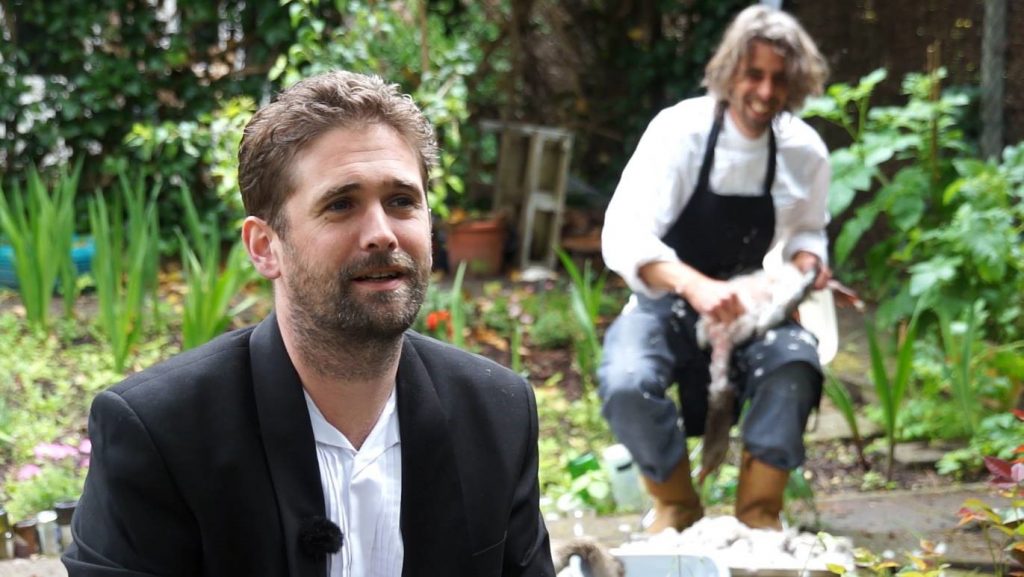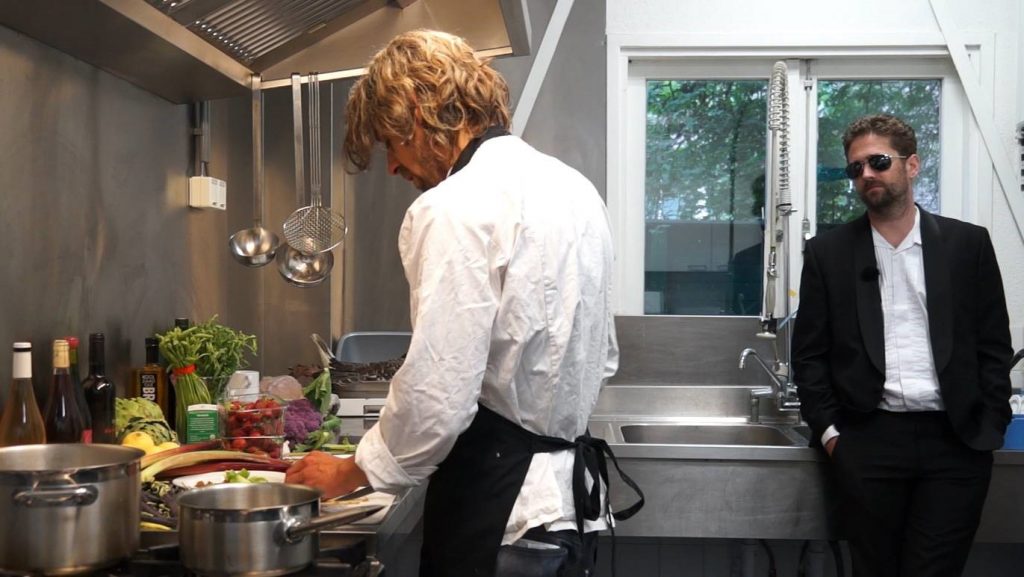Eten op het toneel. Dat is het standaard ‘Theaterdiner’, maar dan spannender. Vooral als tijdens het toetje Shakespeare’s Richard III wordt gespeeld. Toneelgroep Oostpool, het Arnhemse gezelschap dat de laatste jaren flink aan de weg timmert met opvallende voorstellingen, gaat weer een stapje verder in het onderzoeken van de ultieme publiekservaring.
Sjim Hendrix, niet alleen kok, maar ook kunstenaar en ‘voedselidealist’, gaat voor een selecte groep bezoekers van de voorstelling een driegangendiner koken. Na het toetje kunnen vijftig dinergasten plaatsnemen in het decor. Spannend, zeker voor wie de inhoud kent van Richard III: een ondergeschikte aan het Britse hof schopt het uiteindelijk tot koning door effectief al zijn concurrenten te (laten) vermoorden, van alle leeftijden, ook nog eens. Richard III is de ultieme bad guy in het theater, briljant geportretteerd door Shakespeare, die hem zelfs een paar ontroerende kantjes wist mee te geven.
Toch kunnen sommige details van het verhaal je de eetlust doen vergaan. Hoe gaat de kok met die uitdaging om? Ik besloot het hem te vragen:
Richard III is een nogal bloederig en gewelddadig stuk. Hoe werkt dat door in het menu van de maaltijd? Bloedworst? Paardenbiefstuk?
Sjim Hendrix haast zich te vermelden dat er niet alleen dode beesten op het menu staan: ‘Er is ook aan de vegetariërs gedacht. En we hebben ons vooral door de ingrediënten uit de middeleeuwse hofcultuur laten leiden. Want ook toen werden al die trauma’s natuurlijk bestrooid met rozenblaadjes, weggegeten en verdronken in dure wijn. Een feestmaal aan het hof kon in die tijd wel zeven dagen duren, van die overvloed en luxe maken wij een moderne en tot anderhalf uur teruggebrachte versie. Met gerechten die niet alledaags zijn. Er staat onder andere (vergaste) gans in sauce madame op het menu, ingemaakte zomerkoninkjes met heiligenkruid, wilde appeltjes, vis met saffraan en wortelstokken van de cyperus longus (sweet galingale). Maar natuurlijk binden we onze sausen af met een beetje bloed. Dat moest in de traditionele oud-Engelse keukens.’
Het personage Richard III is vooral zo eng omdat hij anderen tegen hun zin meesleept in zijn intriges. Hoe veilig zijn de mee-etende toeschouwers voor Richards manipulaties?
Regisseur Joeri Vos mengt zich in het gesprek: ‘Echt helemaal veilig ben je natuurlijk nooit in het theater.’

Sjim Hendrix is het daar niet mee eens: ‘Je bent juist wel heel veilig: het theater is een plek waar je op een veilige manier situaties en gevoelens ervaart, die je in het echte leven liever vermijdt, zodat je er, na die theaterervaring, misschien weer beter mee om kan gaan.’
Joeri Vos: ‘Het diner is trouwens vooral voorafgaand aan de voorstelling. Het is feestelijk, maar ook informeel: er is heerlijk en bijzonder eten; er wordt een lied gezongen en een sonnet van Shakespeare voorgedragen, van Richard heb je dan in ieder geval nog geen last. Je zit met de acteurs aan tafel, krijgt een kijkje achter de schermen. Later hopen we natuurlijk dat Richard iedereen meesleept.’
Sjim Hendrix: ‘En er is in het theater bijvoorbeeld ook heel goed nagedacht over de brandveiligheid. Er zijn op de wereld heel veel mensen die zich in heel onveilige situaties verkeren en daar hoort ons publiek zeker niet bij.’
Joeri Vos: ‘Maar ze mogen het wel af en toe spannend vinden…’
De dinergasten zitten ook tijdens de voorstelling nog op het toneel. Krijgen zij ook een passieve rol in de voorstelling?
Joeri Vos: ‘De dinergasten zitten nog aan het toetje als de rest van het publiek binnenkomt. Later verplaatsen we ze naar een aparte tribune die op het zijtoneel staat. Voor het publiek op het podium is het alsof ze bij een kleine-zaalvoorstelling zitten, op de huid van de acteurs, en ze hoeven voor de rest zelf niks te dóen – maar natuurlijk heeft het betekenis dat ze op het toneel zijn. De mensen in de zaal zien daar nog een hele hoop mensen zitten: in de ene scene geeft dat de associatie van andere edellieden aan het hof – op een ander moment worden ze aangesproken als “het volk”. En soms zijn ze, net als de mensen in de zaal, ook gewoon toeschouwers.’
Sjim Hendrix: ‘Mensen die niet ingrijpen.’
Joeri Vos: ‘Precies, dat ook: bystanders. Er gebeurt allerlei verschrikkelijks, en de vraag die het stuk ook oproept is: wat hadden we anders kunnen doen, wanneer had de omgeving van Richard in moeten grijpen, waarom laten we alles maar gebeuren.’
Kun je 3 redenen geven waarom mensen mee moeten eten en op het toneel bij het stuk aanwezig moeten zijn?
Sjim Hendrix: ‘De cyperus longus, dus. Dat is een plant die in de oud-Engelse hofkeuken een grote rol speelde. Destijds een veelvoorkomend gras waarvan de wortel naar citrus en amandelen smaakt. Dat gras wordt nu nog mondjesmaat geconsumeerd. Maar het is nog steeds vitaal, het groeit nog steeds. Net als het kwaad. Of het goede. Door dit gras te eten en te bereiden komt het weer even tot leven. Net als deze eeuwenoude tekst. We proberen niet alleen te begrijpen wat goed en kwaad is. Maar ook of we kunnen ruiken en proeven wat schoonheid is.’
Joeri Vos: ‘De cyperus longus is de eerste reden? Goed, dan is reden twee de synesthesia: de samenkomst of samenspraak der zintuigen. We proberen ons verhaal, het verhaal van Richard, te vertellen op een manier dat alle zintuigen het begrijpen.’
Sjim Hendrix: ‘We democratiseren het – we verlenen gelijke macht aan de tong, de neus, de oren, de ogen en –’
Joeri Vos: ‘De tastzin. De huid. Ja, de geuren en de smaken van diner zijn echt een aanvulling op de ervaring die je sowieso al met de voorstelling hebt. Waarin de poëzie van Shakespeare je aanspreekt op je intellect en de muziek direct doordringt tot je gevoel.’
Sjim Hendrix: ‘En een derde reden?’
Joeri Vos: ‘De ontmoeting. Dat wij jullie ontmoeten, dat we anderhalf uur ‘het brood breken’ met ons publiek. Ik ga zelf gastheer zijn, jij staat op de vloer te koken.’
Sjim Hendrix: ‘Ja, ik heb het best druk dan.’
Joeri Vos: ‘De acteurs zitten aan tafel of bedienen, het is voor ons een mogelijkheid om ons publiek te ontmoeten, om hen vragen te stellen, samen te zijn. Ik denk dat dat leuk is, om eens kennis te maken.’
Er is natuurlijk ook best veel reden met de makers te praten als toeschouwer. Zo kan ik me voorstellen dat sommige dingen in het stuk lastig te verteren zijn. Een beroemde scene in Richard III laat bijvoorbeeld zien hoe Richard boven het lijk van haar echtgenoot niet alleen de moord bekent aan Lady Anne, maar haar ook nog eens verleidt. Dat is een lastige scène voor acteurs en vooral actrices om in het huidige tijdsgewricht geloofwaardig te maken. Hoe pakt de bewerker en regisseur dat dit keer aan?
Joeri Vos: ‘Ik vind dat niet zo ongeloofwaardig eigenlijk. Het is theater natuurlijk, en het gaat sneller dan in het echte leven, maar hoe vaak gebeurt het niet – nog steeds – dat een meisje zich laat verleiden door het kwaad? Als ze wanhopig is. Alleen gelaten. Niet meer weet wat ze moet doen? Wat bepaalt het succes van een loverboy bijvoorbeeld: zijn uitzonderlijke versierkunsten, of is ook de extremiteit of uitzichtloosheid van de situatie van zijn slachtoffer? Ik denk het laatste. Ik vind “verleiden” trouwens wel een wat lief woord voor wat Richard doet: hij overweldigt haar – hij brengt haar mogelijkheden terug tot twee: of je doodt me, of je gaat met mee. En zij, ze kiest niet voor het eerste en ziet op dat moment geen derde mogelijkheid. En misschien spelen er nog andere, duisterde gevoelens mee. En het is allemaal best naar, maar niet onbegrijpelijk, niet dom in haar situatie en onder zulke grote druk. En het is echt van alle tijden.’
En dan heb je nog de beroemde woorden: ‘Een paard, een paard, mijn koninkrijk voor een paard!’. Er zijn diverse oplossingen voor gevonden, maar zeker in een moderne setting blijft die uitroep lastig. Hoe lossen jullie dit op?
Sjim Hendrix: ‘Ja, vertel dat eens Joeri? Hoe los je dat op?’
Joeri Vos: ‘Ja zeg… ik ga niet het einde verklappen in een interview hè. Maar wat ik wel wil zeggen: het is natuurlijk verleidelijk om het over dit soort dingen te hebben – over de interpretatie van deze regisseur en dat dan te vergelijken met hoe het stuk eerder is opgevoerd. Dat is een leuke hobby voor dramaturgen en recensenten. Maar ik ben daar nooit mee bezig. Ik heb van dit stuk nooit een opvoering gezien, en ben zeker niet bezig met het “anders” of “vernieuwend” te doen. Ik ben fan van Shakespeare, en ik wil graag dit verhaal van Richard vertellen, Shakespeares poging om iets te begrijpen van het kwaad. Ik vind de inhoud van dit stuk, de vragen die het oproept belangrijk: over wat het kwaad is, of we het een iemand in de schoenen kunnen schuiven, over hoe makkelijk we misschien te manipuleren zijn, hoever we het laten komen voor we ingrijpen, hoe verdrietig en machteloos het ons kan maken en hoe aantrekkelijk en verleidelijk het tegelijk kan zijn. Ik hoop dat na afloop daarover, over dat soort vragen, het gesprek gaat.’
Sjim Hendrix: ‘Of dat we het dan hebben over wat we kunnen doen om de vluchtelingen te helpen.’

